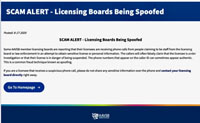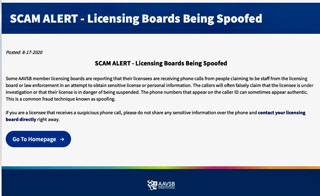
AAVSB screenshot 320

VIN News Service screenshot
Scammers pose as state licensing authorities in an attempt to glean personal information from veterinarians, reports the American Association of Veterinary State Boards.
Click here for a larger view
Veterinarians should be wary of phone calls that appear to come from state licensing agencies or law enforcement with assertions that they are under investigation or their professional license is in danger of being suspended.
The calls could be coming from scammers seeking to obtain the licensee's personal information, according to the American Association of Veterinary State Boards. An alert posted Monday on the AAVSB website instructs licensees who receive suspicious calls to report them to regulators in their respective states.
"We just want to get the warning out to all licensees, so they don't reveal any of their personal information," AAVSB Executive Director Jim Penrod said by email. He did not indicate numbers of veterinarians solicited by fraudsters or states where spoofing is most prevalent.
Spoofing is common, authorities say, and happens when a scammer adopts what appears to be an email address, sender name, phone number or website URL of a trusted source in order to fool receivers into believing the message or call is legitimate. "The phone numbers that appear on the caller ID can sometimes appear authentic," reads the AAVSB alert.
The problem isn't unique to veterinary medicine; it happens across multiple professions and regulatory agencies, including the U.S. Drug Enforcement Agency. "The callers typically identify themselves as DEA personnel and instruct their victims to pay the 'fine' via wire transfer to avoid arrest, prosecution and imprisonment," the agency said last fall in an online notice about an 'alarming increase' of scam calls.
The Maine Board of Veterinary Medicine says its licensees are among those experiencing spoofing. A board-issued alert dated Aug. 14 reports that the fraudulent calls appear to be coming from the state's Office of Professional and Occupational Relation or the Department of Professional and Financial Regulation.
"These scammers are contacting licensees in an effort to get licensees to share personal information," the alert reads. "The scams are likely to vary but they include telling the licensees that the licensing board or other regulator has opened an investigation and their license has been suspended or revoked. The scammer then asks the licensee to share or verify personal information over the phone."
Licensees in that state who might be a victim of an attempted fraud are instructed to contact the Maine Attorney General Consumer Protection Division at (800) 436-2131 or https://www.maine.gov/ag/consumer/complaints/.